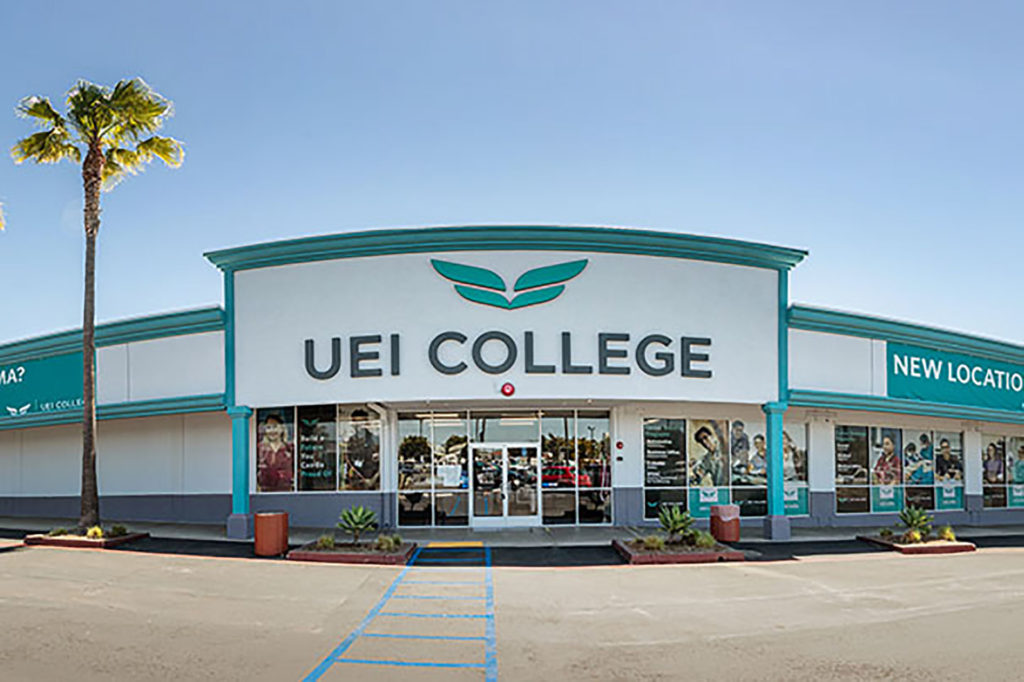
What do you envision when you think of a college? Is it a sprawling university campus that offers four-year degrees, or perhaps it’s a two-year community college structure that offers a wide range of classes to a regional population of people?
Or maybe, the topic of college takes your mind down a different road – a journey that forces you to consider bigger-picture concerns such as expensive tuition, moving expenses, room and board, and achieving an achievable balance between work, family and school.
Regardless of your personal impressions of what makes a school a bona fide “college,” most would agree colleges exist based around a relatively straightforward motivation: to prepare students for a new or better career following graduation.
At career colleges such as UEI College, entire curriculums are based around this specific goal. Rather than giving students a broad educational experience that may or may not apply to certain occupations, students who attend career colleges are trained to develop the knowledge, skills and experience they need to earn entry-level positions within specific career fields. So, what exactly is a career college? This blog post will explain what is a career college in much detail.
If you’re interested in becoming an HVAC Technician, Dental Assistant, Medical Assistant, Automotive Technician, or Electrician, consider enrolling in one of UEI’s Career Training Programs. Most programs can be completed in as few as 10 months, placing you on the fast track to a new rewarding career.
Want to Attend UEI? Learn More About Admissions. CLICK HERE >
What is a career college?
A career college, also known as a trade school or vocational college, is an educational institution that provides students with the knowledge, skills, and hands-on training required for a specific career. For example, if a student wants to become a medical assistant, a career college will provide that student with only the knowledge and skills required for a medical assisting career. Topics that are not relevant to a specific career are not taught.
Career colleges are different from traditional four-year colleges. At a four year college, a student is taught a variety of different subjects whether they apply to a career the student wants to pursue. On the other hand, a career college teaches students the specific knowledge, skills, and training they need for a career such as medical assisting, dental assisting, or HVAC technician.
Programs and curriculums at career colleges are typically structured around building the skills which employers are seeking in new, up-and-coming career professions. These may include entry-level positions in fields like healthcare, business/office administration, and technical professions. As such, career college administrators often keep tabs on employer trends, demands, and needs, then develop and/or modify their programs in order to accommodate these market evolutions to improve demand and placement for their graduates.
How is a career college different than a traditional college?
The greatest difference between a career college and a more traditional two- or four-year college can be found in the classrooms and the curriculum. Where a university may require students to take a broad range of general education classes meant to develop a student’s intellect, curiosity, research abilities, etc., career colleges offer a different and more direct approach.
At career colleges like UEI College, the programs offered cut to the chase of what’s required to break into a specific field or career. Through a mix of classroom and hands-on training, the goal of a career college is to help students develop knowledge, skills, and experience that prepares them to enter a new career immediately after graduation.
As such, students can often complete entire training programs in months rather than years. And once graduated, career colleges often make use of their local industry contacts to actively help students find a position within their field of choice.
Want to Attend UEI? Learn More About Admissions. CLICK HERE >
What programs do career colleges offer?
Career colleges provide training within a wide range of vocational fields, providing students with the knowledge and skills they need to earn entry-level employment within a particular business type or industry.
A career college education may include medical and administrative training for those seeking an entry-level career in healthcare; business training for students interested in working within an office environment; technical training for people seeking to develop skills in electric, HVAC, automotive, welding, and so on.
Here at UEI College, we offer the following programs
- Medical Assistant
- Dental Assistant
- Medical Billing and Insurance Coding
- Medical Office Specialist
- Pharmacy Technician
- Automotive Technician
- Heating, Ventilation and Air Conditioning (HVAC)
- Criminal Justice
- Electrician Technician
- Welding Technician
- Business Office Administration
How long are career college programs?
Career college program curricula generally take weeks or months (rather than years) to complete. At UEI College, most programs can be completed and earn a diploma in as few as 10 months, qualifying graduates to start entry-level positions in their new careers less than a year after enrollment.
How much does career college cost?
The cost of attending a career college varies from school to school. Check with the admissions team to learn specific costs. However, since career colleges can generally be completed in a shorter time period than traditional two- and four-year schools, it’s often considered to be an economical path for those who want to pursue post-secondary education.
Plus, at UEI College, financial aid is available to those students who qualify. Our financial aid team regularly works with students to help create a financial path toward education that may include grants, loans, scholarships, and personal contributions. And, if you’re in the military, active duty, a veteran, a reservist, or a military spouse or dependent, additional financial aid options may be available for you. Contact our financial aid team to learn more.
What are the Benefits of Vocational School?
While each and every career college and vocational school is different in its own way, most tend to offer the same (or similar) general benefits when compared with other, more traditional post-secondary schools.
The main advantage, as described above, is that career colleges/vocational schools typically focus their entire educational experience on developing knowledge and skills specifically required to break into a particular career field. No general education classes; just hands-on training that helps ensure you are able to learn, practice, and even apply the skills employers are looking for within your field of interest.
Secondly, vocational school programs can typically be completed in weeks and months – not years. And once completed, career colleges often help place you into your first post-graduate position so you can begin not only earning but also developing experience and honing the skills you’ll need to grow within your new career.
And finally, vocational school faculty is often made up of instructors with vast, real-world experience in the fields they teach. They’ve been there, done that, so they know what it takes to succeed within a particular industry – and they strive to pass this knowledge off to their students.
Why Choose UEI?
We may be a little biased, but we truly feel the culture of support and excellence we have developed at UEI College over the last four decades is second-to-none. While our educational model may be similar to other career college options, the UEI College experience is one that sets us apart from other post-secondary education schools. Thanks to an approach that focuses on student success, students choose our school because UEI is:
- Fast – Students can get hands-on prep and training they need to earn a diploma and start a new career in as few as 10 months. Not only that, but since most programs start new classes each and every month, there’s little to no wait when you’re ready to enroll in a program.
- Flexible – UEI knows the balance between work, family, and school can be difficult, so we strive to be flexible with everyone’s busy schedule by offering both weekday and evening classes. We also offer a hybrid model that allows students to study from the comfort of their homes while still gaining hands-on training through on-campus lab sessions.
- Professional – The instructors at UEI often boast years of experience within the professions they teach, ensuring they pass along experience and skills that are most relevant to future employers.
- Supportive – From the moment you walk through the door, the UEI College staff ensure each student is offered the support they need to achieve their goals – from application, enrollment, and financial aid to classroom instruction, on-the-job experience, and professional placement after graduation.
- Caring – It’s our belief that everyone deserves a chance – sometimes a second chance – to achieve their career goals. Even when students come to us without a high school diploma, they still have education options at UEI.
To learn more, visit the “Top 10 Reasons to Enroll at UEI College” post on our blog.
Frequently Asked Questions
1. What courses do career colleges offer?
Career colleges such as UEI may offer the following courses: dental assistant training, medical assistant training, HVAC technician training, medical billing and insurance coding training, automotive technician training, and electrician training. The availability of courses at UEI may vary; check the latest course catalog for available courses.
2. How long does it take to complete career college?
Some of the programs at career colleges such as UEI career college can be completed, and you can earn a diploma in as few as 10 months. The amount of time it takes to complete a program depends on the program itself. The course catalog is the best destination to determine the length of the program you’re interested in.
3. Is it hard to get into UEI Career College?
It is not hard to enroll in UEI career college. If you are interested in enrolling at UEI, please contact our admissions team, and an admissions team member will provide you with all you need to know about enrolling in a specific program.
4. Is it worth attending a career college?
Attending a career college is definitely worth it because it provides you with the knowledge and skills you need for an entry-level career, such as a dental assistant, medical assistant, or HVAC technician career.
Want to Attend UEI? Learn More About Admissions. CLICK HERE >





